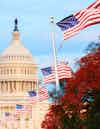Strategic Advocacy
The Strategic Advocacy division is comprised of several major policy divisions within the Chamber including theCyber, Space, and National Security Division; Economic Policy Division; Employment Policy Division; and Small Business Policy Division. Environmental Affairs and Sustainability, Health Policy, and Transportation and Infrastructure Policy are also under the umbrella of the Policy Group.
The division works closely with the Chamber's Congressional and Public Affairs and Political Affairs and Federation Relations divisions.
Explore more
- Center for Global Regulatory Cooperation
- Cyber, Space, and National Security
- Economic Policy
- Employment Policy
- Environmental Affairs and Sustainability
- Global Initiative on Health and the Economy
- Government Affairs
- Health Policy
- Small Business Policy
- Tax Policy
- Transportation and Infrastructure Policy
- Federal Acquisition Council
Latest Content
The U.S. Chamber issued the following statement on the Biden Administration's "Time is Money" initiative.
The business community is calling on the current and future Administrations to create balanced chemical regulations in light of varying frameworks.
The following letter was sent to Meena R. Sharma, Acting Director in the U.S. Department of the Treasury’s Office of Investment Security Policy and International Relations, on August 2, 2024.
The Amazon Labor Union has elected a new president, replacing Chris Smalls.
Controversial Appointment Receives No Republican Support
Bill Would Require a Quorum in Union Representation Elections
Watson McLeish, Senior Vice President for Tax Policy at the U.S. Chamber of Commerce, released the below statement on the Tax Relief for American Families and Workers Act of 2024 (H.R. 7024), which would provide critical, long-awaited support and certainty to American businesses of all sizes.
U.S. Chamber Opposes the Confirmation of NLRB Chair Lauren McFerran for Another Term
Small business owners share why extending 2017 tax reforms is important for growth and investment across America.
Board Restores Union-Friendly Rules





